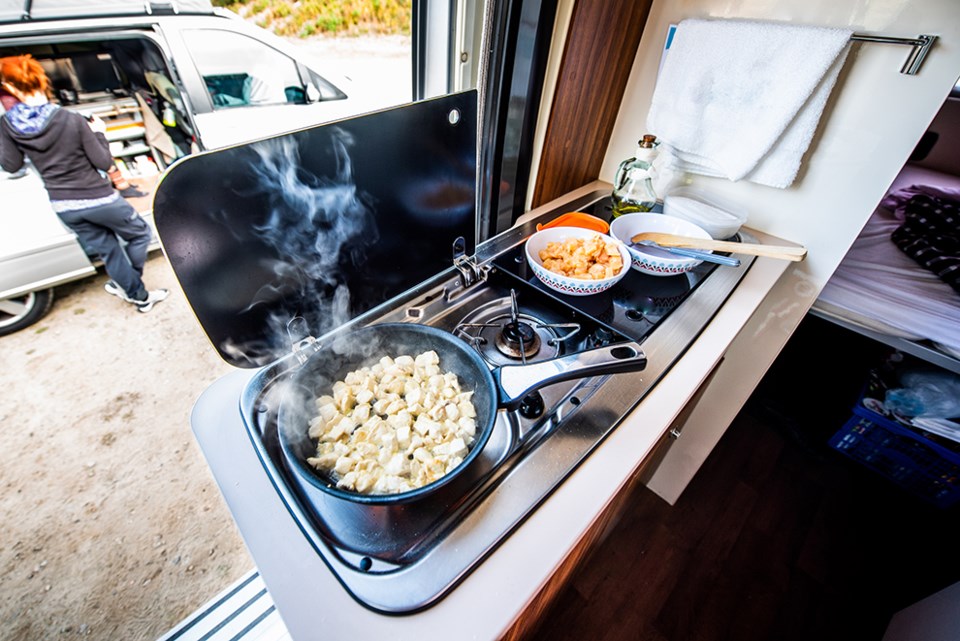In the two years that she and her husband have called a camper in the back of their Chevrolet Silverado home, Noémie Anselme has experienced numerous occasions where they've felt unwelcome.
Anselme lives in the 30-year-old camper with her husband, Adam and she has not lived in traditional housing for more than six years. Before coming to Canada, she lived in a van dwelling in France for two years, and lived out of a tent during a bike trip for another two-and-a-half years.
She has had issues in �鶹�����that weren't present in France, noting that the couple has experienced late-night disruptions even in far-afield areas such as at the end of local forest service roads.
"I often wonder if it's because we had a nicer-looking van in France than we do in Squamish, but I don't think so," she said. "We had very few bad interactions with people in France, but in Squamish, it's very different.
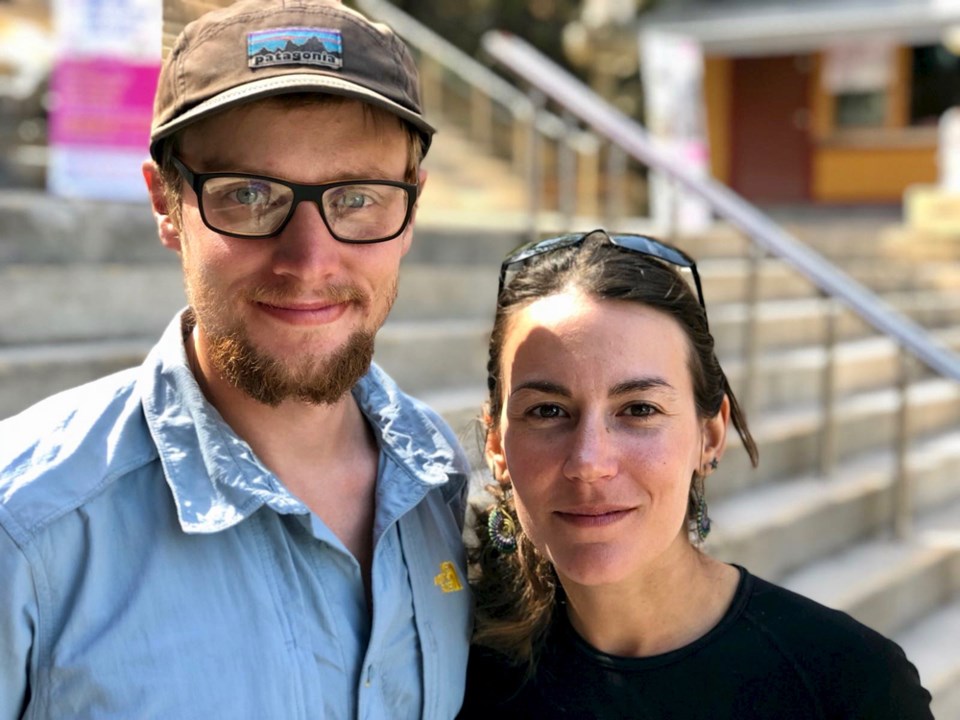
"We had people driving past, beeping at night, trying to wake us up. We've had people cycling past, shouting and insulting us."
Anselme said their vehicle hasn't suffered any attacks on their vehicle, but friends of theirs have had tires and windshields damaged.
Anselme reached out to The Chief to share her family's perspective as �鶹�����council ponders a ban on camping in town except in designated campgrounds.
Speaking on Aug. 8, Anselme said that she and her husband were currently set up in the District of �鶹�����campground on Loggers Lane, which is currently accepting only monthly rentals during the COVID-19 pandemic. At this point, she doesn't know if it's a long-term solution, with winter approaching. As well, she stressed that it's not an atmosphere that makes sense for all vanlifers.
"The campground is a very social place and it's impossible to avoid talking to people," she said. "There are some people who could be on the autism spectrum or have serious anxiety problems … it's not a solution for everyone."
The proposed bylaw would extend a ban on camping and vehicle dwelling to anywhere within District boundaries, with the exception of designated campgrounds.
Currently, living in a vehicle is banned in the �鶹�����Estuary and the Mamquam River Forest Service Road. However, authorities have still been clearing out vanlifers outside of those two areas using traffic bylaws that prevent people from sleeping in their vehicles.
The issue with this bylaw, say District staff, is this requires waking people up in the middle of the night and forcing them to leave.
The new vanlife ban would allow officers to clear them out during the day.
It has so far passed three readings, but after facing sizeable opposition in the form of letters and a petition, council held back on adopting the proposed bylaw, saying that it requires more work.
Another vanlifer, Fernando Vieira, moved his Mazda 6 and his husky out of town limits as the bylaw change was before council.
While he hadn't experienced the same level of friction with residents that Anselme has, the 10-year resident said he's felt pushed out by the local government with more restrictions in parks and signage popping up across town.
"It was starting to be pushed outside, outside, outside," he said, speaking on July 26 from a lake just north of town. "I don't want to be chased and told to move every single day.
"It's already happening."
For the most part, in his decade in town, Vieira said he's found common ground with other residents, ranging from artists to athletes, regardless of their respective living situations.
"Everyone likes the outdoors," he said. "Even if you're from another country, we share a passion.
"You're part of the community."
Vanlifing responsibly
Proponents of the bylaw cite issues such as litter and improper disposal of human waste as major reasons for their support.
Both Vieira and Anselme agree, feeling that an irresponsible segment creates problems for those like themselves who take great pains to ensure they're pursuing the lifestyle in a respectful manner.
"People who are living full-time here in Squamish, they're working, they have a presence in the community and they get affected by it," Vieira said.
Vieira also understands and respects the stance of homeowners, who work hard to pursue their own lifestyles in �鶹�����and shouldn't have to deal with those who are rowdy and messy mere metres from their front doors.
While the winter is generally quiet for tourists, in the spring, Anselme observes people coming to town regularly leaving garbage outside.
"I don't like doing it, but I have been going and talking to people that I've seen, trying to tell them, 'Can you please not make it look like you're picnicking outside?' or 'Can you please not leave your garbage out?'" she said. "When people were leaving trash out, I would go and grab it behind them.
"I feel that people that work and live in their vehicle in Squamish, we all do that … They all clean up after other people to make sure that they don't get blamed for it."
In terms of relieving themselves, both said using public restrooms is a major part of the strategy. Anselme noted that, for a while, she and her husband parked near the Sandman Hotel with close access to Walmart.
As a last resort, Anselme said she and her husband employ similar strategies as when they go big-wall climbing — use a bag.
"It's not fun and no one likes to do that," she said.
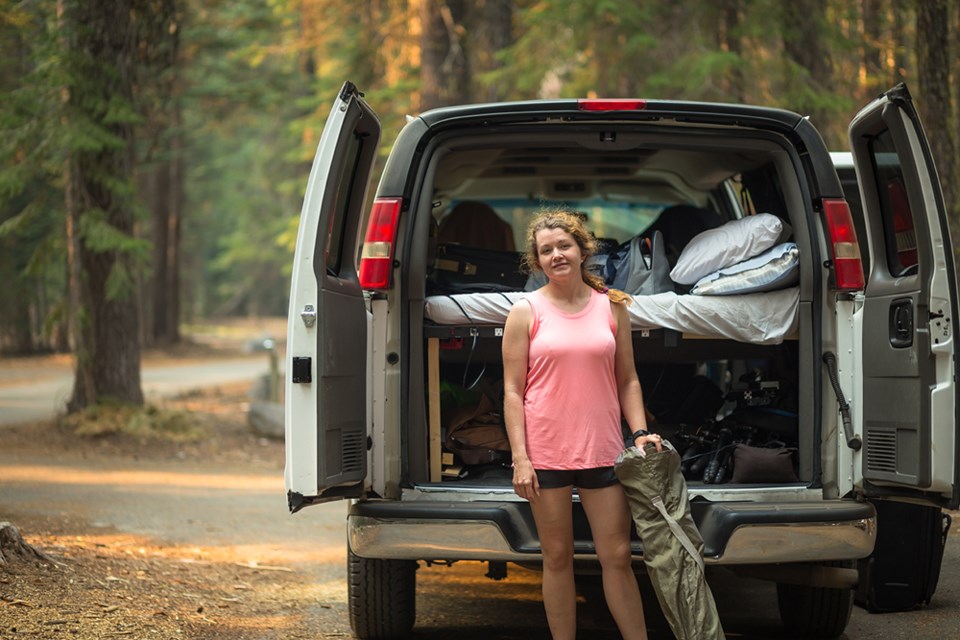
The feeling of freedom
Even though it sometimes involves defecating into a bag, enduring cold winter nights, and having sleep interrupted by honking passers-by, the lifestyle still holds great appeal.
"It's simple. You don't have too much space so you don't have too much stuff. You feel closer to nature. You're outside all the time. You don't have to work as much as you do when you're paying rent," said Anselme, who works as a bike mechanic in town.�� Her husband, meanwhile, works at a store in town, too.
In a follow-up email, Anselme added that she and Adam actively pursue an environmentally conscious lifestyle as they don't eat meat, use only about 25 litres of water a week, employ solar panels for electricity and, despite living in a vehicle, ride their bikes as much as possible.
In a lot of ways, Vieira said, �鶹�����is an ideal place to use as a home base while providing access to other outdoor hubs in Rossland, Whistler, the Lower Mainland, and Vancouver Island.
"It's a place where I can work, make a little bit of money, and then travel again," said Vieira, who works in construction and landscaping.
While vanlife fits in many ways with Vieira's lifestyle, in others, it's an economic decision to help him realize his outdoor pursuits.
"I can afford to pay [rent] sometimes when I'm working, but just to have an outdoors life — hiking and climbing and doing all those kinds of things — you have to manage many things and having those privileges for some people is a little bit harder," he said, noting that when he's short on funds, he'll head back to live with family in Mexico for the winter.
Among the good times was last summer, Vieira said, when he was pouring concrete and being paid a fair wage.
"I was pretty happy. I was being paid properly," he said.
Vieira, a permanent resident, said he's also observed vehicle dwellers forced into their cars and trucks by high cost of living and housing prices, including families and seniors, without much camping experience or preparedness.
"I'm seeing more places being built — and I'm working on them — but I don't see a way a low-income family can move in," he said.
For the bylaw — with some exemptions
The Chief attempted to contact several residents who supported the proposed bylaw, though only one responded and was willing to be interviewed.
"I'm very much in favour of it," Adrien Byrne said on July 29. "There's an environmental reason for it, and there's a coronavirus reason for it."
Byrne has lived in �鶹�����for five years, lives downtown and regularly visits the �鶹�����Estuary, where he's observed the issues most acutely.
"I've come across piles of garbage and waste and even syringes, which is pretty gross, given that it's pretty sensitive conservation land," he said.
Byrne added that despite rules and signage requiring dogs to be leashed, he regularly notices van dwellers' dogs roaming unleashed. It's especially a problem, he said, in springtime when black bear cubs are around.
Other areas where Byrne has seen problems include downtown streets, the road leading toward the terminals, and near the Stawamus River Trail, has seen "pretty disgusting garbage" including human waste.
Byrne respects van dwellers who are residents and would support "some sort of exemption or licence fee" but is more concerned, especially during a pandemic, about those who are coming from as far away as Quebec or, potentially, Washington state or California as he worries that some travellers are exploiting the en-route-to-Alaska loophole.
"There's really no way to contact trace or manage that from a COVID point of view. I think it's probably an undue burden on the health system at this point during the pandemic," he said.
"I'm very sympathetic to residents of �鶹�����and people that have ties to �鶹�����or the whole Sea to Sky," he added.
Among the biggest issues on The Chief's Facebook page was litter and waste, while others pointed out that there's no equivalent to a property tax for vanlifers to contribute to municipal coffers.
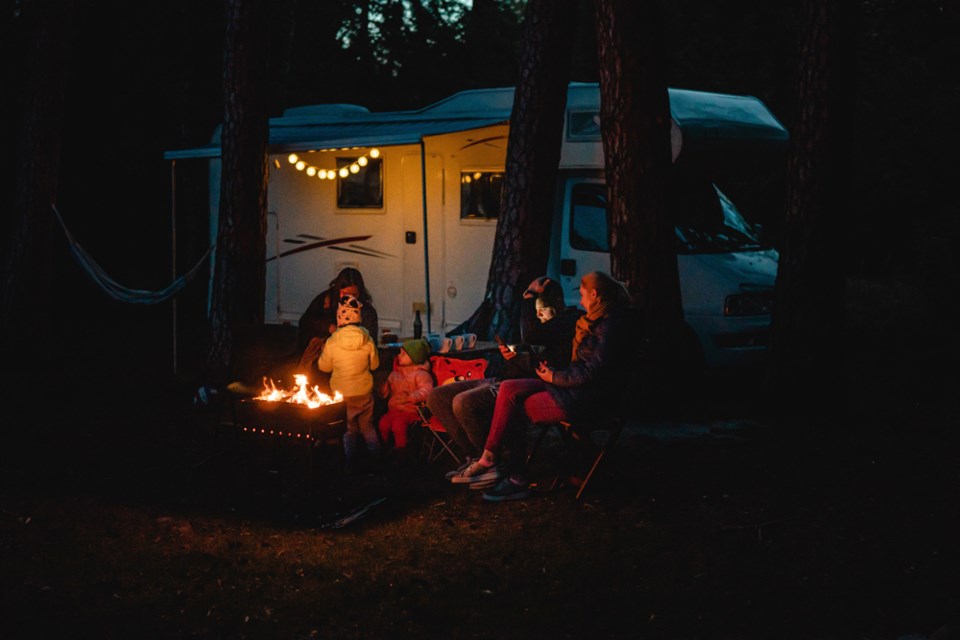
Visiting in a van
Craig Cleary's 18-year streak of visiting �鶹�����in a camper will end this year due to the COVID-19 pandemic.
The nomad, who primarily resides in the Pacific Northwest, said he and his wife — both avid mountain bikers — regularly stop in town on the way up to Whistler, Pemberton, and the Chilcotins and again on the way home.
The couple has had several friends who lived in Squamish, and they could stay nearby, but many have moved on. More recently, they post up in their 23-foot RV near the estuary with their two dogs.
��"There's freedom. There's no arrival time. There's no departure times," Cleary said. "It makes it really easy to wake up, go for breakfast, meet people at the visitor's centre to go on bike rides."
Just because the couple isn't paying for accommodations doesn't mean they're not supporting local establishments. Cleary enjoys going to the WaterShed Grill, local bakeries and was sad to hear of Shady Tree Pub's closure. He also bought a bike that wasn't available in the U.S. at Republic Bicycles last fall.
In recent trips, Cleary tested the waters by parking in a residential area, but feeling uneasy, now opts against it.
"That wasn't as casual as it once was," he said. "We're like, 'OK, let's just ride our bikes from town and go up into there so we didn't have to park — especially a van — in the neighbourhood where we were riding, where the trails started."
Cleary also spends time camping in Idaho and, during the winter, will head down to southern Baja California, but sets up primarily in Washington and Oregon. He said �鶹�����has changed in a way that his other hangouts haven't.
"�鶹�����has become a much bigger town and many of the other places that we go have not," he said. "We have good experiences everywhere we go as far as being able to just camp."
Cleary also recommends that campers use apps such as iOverlander, which provides user-sourced information all over the globe about the best places to camp.
In his travels, Cleary has observed bad apples everywhere.
"Let's face it, there are quite a few people using bad camping etiquette and there's trash, and there's sanitary issues," he said. "It's just disheartening. I'm not blaming it on necessarily one town."
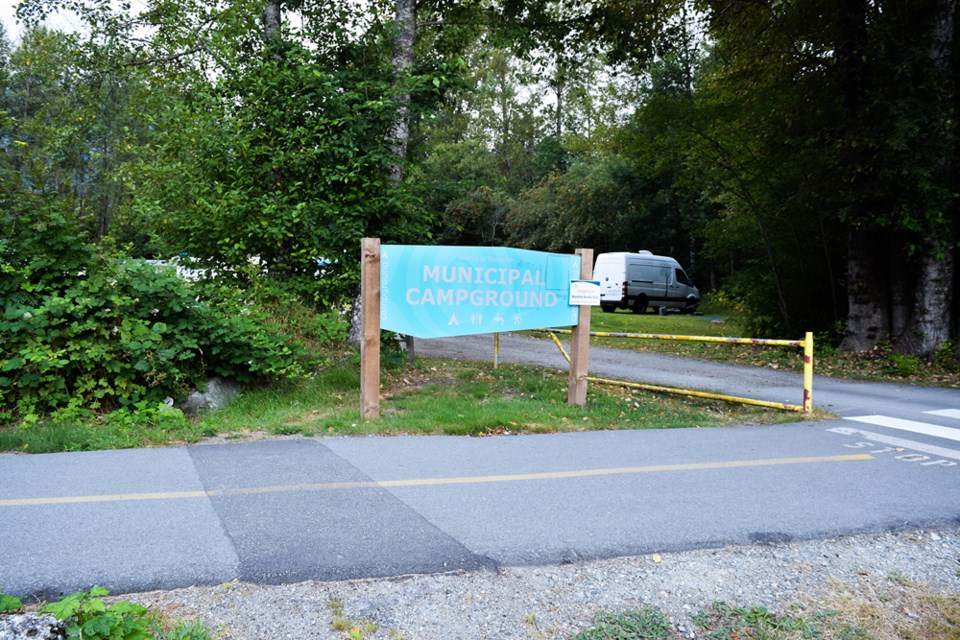
Checking in at the campground
For long-term residents, the only current campground option is the District of Squamish's (DOS) campground on Loggers Lane, which hasn't seen much usage since reopening on June 29.
DOS general manager of community services Natasha Golbeck said as of July 30, only 11 vehicles were in the campground, which has 36 sites, with multiple vehicles allowed on one site if users are part of the same bubble. Each site costs $200 a month plus tax.
"It's been quite empty since the pandemic hit," she said.
Currently, the campground is only available for monthly rentals to discourage tourist use.
For a time, the DOS considered limiting campground use to those receiving assistance, such as the Canadian Emergency Response Benefit (CERB), but since moved away from that.
"We've since really pulled back on that because there was a lack of clarity about the kind of documentation that would be accepted. Do we keep a copy of that documentation? In the end, council directed us to keep it as open as possible," Golbeck said. "If you show up and you want to stay here, then you are invited to stay here."
In these early days, Golbeck was unsure how long people are staying, though campers can't book multiple months at a time. The DOS intends to survey the campers after they've started to settle in and create a sense of community.

"In the future, we will do some engagement to figure out why are people using this resource and is this meeting their needs?" she said.
The Mamquam River Campground, meanwhile, takes campers for 14 days.
What's next
If the bylaw passes without allowances for residents, Anselme and her husband will have to reconsider living in the area.
The couple doesn't drive often, opting to cycle as much as possible.
��"I know it sounds a bit weird. We live in a vehicle and we don't like driving," she said.
Therefore, heeding the suggestion of basing near the Cheakamus Canyon or at the end of �鶹�����Valley Road isn't necessarily workable, especially when she starts work at 7 a.m. and he doesn't start until noon.
Most frustrating for Anselme is how, when she's riding her bike, cars are often in the same place for long periods of time, just like hers, without issue.
"I see the amount of cars on the side of the road and they are just parked and they don't move," she said. "I find it ironic that people and, in general, locals are upset about seeing us living in our vehicle are never upset about a vehicle when there's no one in it.
"It's sad to think that cars have more rights than people."
��
**Please note, this story has been corrected since it was first posted. Thetakes campers for 14 days, not five as originally stated.��
